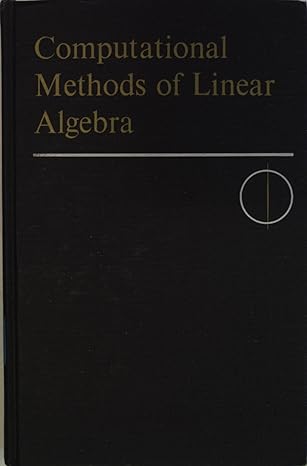
|
FreeComputerBooks.com
Links to Free Computer, Mathematics, Technical Books all over the World
|
|
- Title: Applied and Computational Linear Algebra: A First Course
- Author(s) Charles L. Byrne
- Publisher: University of Massachusetts
- Hardcover/Paperback: N/A
- eBook: PDF, 504 pages, 2.2 MB
- Language: English
- ISBN-10: N/A
- ISBN-13: N/A
- Share This:

|
This book is intended as a text for a graduate course that focuses on applications of linear algebra and on the algorithms used to solve the problems that arise in those applications. Often the particular nature of the applications will prompt us to seek algorithms with particular properties; we then turn to the matrix theory to understand the workings of the algorithms.
About the Authors- Charles L. Byrne is a Professor at University of Massachusetts, Lowell.
- Linear Algebra, Matrix Algebra, and Linear Systems
- Algebra, Abstract Algebra, etc.
- Computational and Algorithmic Mathematics
- Mathematical and Computational Software
- Number Theory
- Calculus and Mathematical Analysis

- Applied and Computational Linear Algebra: A First Course (Charles L. Byrne)
- The Mirror Site (1) - PDF
- The Mirror Site (2) - PDF
-
 Notes for Computational Linear Algebra (Jessy Grizzle, et al.)
Notes for Computational Linear Algebra (Jessy Grizzle, et al.)
This book presents methods for the computational solution of some important problems of linear algebra: linear systems, linear least squares problems, eigenvalue problems, and linear programming problems.
-
 Matrix Algebra with Computational Applications (Dirk Colbry)
Matrix Algebra with Computational Applications (Dirk Colbry)
This book is designed to introduce students to the use of Linear Algebra to solve real-world problems. These materials were developed specifically for students and instructors that emphasizes hands-on problem-solving activities.
-
 Computational Linear Algebra and N-dimensional Geometry
Computational Linear Algebra and N-dimensional Geometry
This undergraduate textbook on Linear Algebra and n-Dimensional Geometry, in a self-teaching style, is invaluable for sophomore level undergraduates in mathematics, engineering, business, and the sciences.
-
 Computational Methods of Linear Algebra (V. N. Faddeeva)
Computational Methods of Linear Algebra (V. N. Faddeeva)
This book presents methods for the computational solution of some important problems of linear algebra: linear systems, linear least squares problems, eigenvalue problems, and linear programming problems.
-
 Algebra: A Computational Introduction (John Scherk)
Algebra: A Computational Introduction (John Scherk)
This book is a unique approach and presentation, the author demonstrates how software can be used as a problem-solving tool for algebra. It includes many computations, both as examples and as exercises.
-
 A Computational Introduction to Number Theory and Algebra
A Computational Introduction to Number Theory and Algebra
This introductory book emphasises algorithms and applications, such as cryptography and error correcting codes, and is accessible to a broad audience. It covers the basics of number theory, abstract algebra and discrete probability theory.
-
 Applied Linear Algebra: Vectors, Matrices, and Least Squares
Applied Linear Algebra: Vectors, Matrices, and Least Squares
Combines straightforward explanations with a wealth of practical examples to offer an innovative approach to teaching linear algebra. Requiring no prior knowledge of the subject, it covers the aspects of linear algebra - vectors, matrices, and least squares
-
 Linear Algebra (Jim Hefferon)
Linear Algebra (Jim Hefferon)
This textbook covers linear systems and Gauss' method, vector spaces, linear maps and matrices, determinants, and eigenvectors and eigenvalues. Each chapter has three or four discussions of additional topics and applications.
-
 Linear Algebra: A Course for Physicists and Engineers (Arak Mathai)
Linear Algebra: A Course for Physicists and Engineers (Arak Mathai)
This textbook on linear algebra is written to be easy to digest by non-mathematicians. It introduces the concepts of vector spaces and mappings between them without too much theorems and proofs. Various applications of the formal theory are discussed as well.
-
 Fundamentals of Matrix Algebra (Gregory Hartman)
Fundamentals of Matrix Algebra (Gregory Hartman)
A college (or advanced high school) level text dealing with the basic principles of matrix and linear algebra. It covers solving systems of linear equations, matrix arithmetic, the determinant, eigenvalues, and linear transformations.
-
 Matrix Algebra (Marco Taboga)
Matrix Algebra (Marco Taboga)
This is a course in matrix algebra, with a focus on concepts that are often used in probability and statistics. Matrix algebra is one of the most important areas of mathematics for data analysis and for statistical theory.
-
 Advanced Linear Algebra: Foundations to Frontiers (Robert Geijn)
Advanced Linear Algebra: Foundations to Frontiers (Robert Geijn)
The focus is on numerical linear algebra, the study of how theory, algorithms, and computer arithmetic interact. These materials keep the learner engaged by intertwining text, videos, exercises, and programming activities in consumable chunks.
-
 Linear Algebra: Foundations to Frontiers (M. Myers, et al.)
Linear Algebra: Foundations to Frontiers (M. Myers, et al.)
This book is an introduction to the basic concepts of linear algebra, along with an introduction to the techniques of formal mathematics. It begins with systems of equations and matrix algebra before moving into the advanced topics.
-
 Linear Algebra - Theorems and Applications (Hassan Abid Yasser)
Linear Algebra - Theorems and Applications (Hassan Abid Yasser)
This book contains selected topics in linear algebra, which represent the recent contributions in the most famous and widely problems. It includes a wide range of theorems and applications in different branches of linear algebra, etc.
-
 A First Course in Linear Algebra (Robert A Beezer)
A First Course in Linear Algebra (Robert A Beezer)
Linear Algebra: Foundations to Frontiers (LAFF) is packed full of challenging, rewarding material that is essential for mathematicians, engineers, scientists, and anyone working with large datasets.
-
 Linear Algebra with Applications (W. Keith Nicholson)
Linear Algebra with Applications (W. Keith Nicholson)
The aim of the text is to achieve a balance among computational skills, theory, and applications of linear algebra. It is a relatively advanced introduction to the ideas and techniques of linear algebra targeted for science and engineering students.





